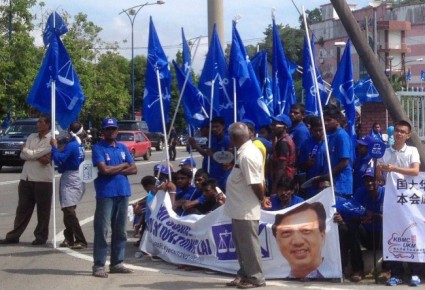In Taman Desa, in Teresa Kok’s (Democratic Action Party/DAP) electorate of Seputeh, I asked a Bangladeshi worker about Malaysian politics. Why not, after all? These workers have invested their labour, their lives, and their aspirations in Malaysia, just as much as past generations of foreign workers have. Unlike the foreign workers of today, those of the past are familiar. They became Malayans. Their descendants are now Malaysians.
Rumours and leaks are circulating like wildfire that legions of foreign workers are being mobilised and transported by air to vote for BN in tomorrow’s election. Organisations like Anyone/Anything But UMNO (ABU) are preparing to monitor polling stations tomorrow, and one of their aims is to identify these workers and discourage them from voting.
Yet if these workers really have been granted citizenship and voting rights, then can they really be held to remain ‘foreign’ workers? If they are citizens and voters, then no matter the basis on which their citizenship was granted, why not attempt to gauge their views on the election also?
This worker claimed he had not been offered an identity card, and the citizenship indicated by its possession, and so could not vote. Yet he also claimed to know numbers of other workers who do hold ICs (national identity cards): Bangladeshis, Pakistanis and Indonesians. His brother also held an IC, but that was different, he said. That was “legitimate” citizenship, gained after he married a Malay woman and was naturalised. It was important to this worker that this distinction was made and understood.
So did he want an IC? Not on this basis. Not for the election. “Dia orang bagi IC pun saya tak mau.” Why? Because “Malaysia punya politik orang curi-curi bikin. Tada lawan, tada action.” It turned out this worker was a man of action; a committed political activist and party worker in Bangladesh. Which party? He didn’t say any more than “Itu parti lawan sama itu Sheikh Hasina party”. OK.
So what about people who wish to monitor the election and keep “foreigners”, now citizens, away? “Eh, kalau dia orang bagi Bangla punya IC, you siapa mau lawan sama dia? You orang mana? You dulu punya orang luar kah?” Good questions. On what basis can the descendants of foreign workers, now citizens, tell other foreign workers, now citizens, not to vote? I hear answers predicated on notions of “entitlement”, but then how is this entitlement construed and defined? On the basis of years spent working in Malaya, adapting and learning the language, putting down local roots, and not planning to leave? Surely large numbers of foreign workers are in precisely that position, even if their citizenship appears to be granted for the “wrong” reasons?
This particular worker did not wish to leave Malaysia. I asked him if he’d like to stay. “Ya lah, siapa tak mau tinggal sini?”
So he’d like a future here too. But what sort of future? As a citizen? “Ya lah.” And what sort of political future? “Ayo, kalau gorrment masih ada, kalau gorrment jatuh pula, saya apa peduli?” Was he familiar with the parties involved? “Ya, saya tahu sini ada tiga parti. Itu rocket, itu bulan, itu mata. Ini parti tiga-tiga lawan sama satu parti, itu dacing.” So which did he prefer? “Saya apa peduli kalau rocket kah, bulan kah, dacing kah?”
This worker seems ready for either possible outcome tomorrow. No investment in either contending coalition. He just wants to stay in Malaysia, on some basis that he considers appropriate, and perhaps like his brother, achieve citizenship.
But what is a Malaysian citizen?
This worker’s words also raise another question. Given this worker’s lack of investment in either of tomorrow’s contending coalitions, how do we know that foreign workers will vote for Barisan, even if they are being mobilised to do so? Are there specific coercive measures that might compel these workers to vote one way, when they are presumably astute enough to identify a close race when they see one? Why would a worker who wishes to stay vote for a coalition which might just lose? Just as much as anyone else, these workers are being asked to gauge their future prospects and make a decision. Perhaps it is unwise to assume their decisions can be predicted with so much certainty in uncertain times.
How would this worker assess which way the wind’s blowing? His tip: “You tengok askar. Mana askar pergi, gorrment juga pergi. Askar tukar, gorrment tukar. Askar tada tukar, gorrment tada tukar.” (You look at the soldiers. Where the soldiers go, the government goes too. Soldiers change, government changes. Soldiers don’t change, government does not change).
Dr Amrita Malhi is a Research Fellow in the Hawke Research Institute at the University of South Australia. She is working on a monograph on the production of ‘Muslim’ as an anti-colonial identity in a 1920s uprising in Malaya; supported by an Social Science Research Council postdoctoral fellowship in transnational research, with funds from the Andrew W. Mellon Foundation. Her PhD was awarded the 2010 J.G. Crawford Prize at the Australian National University.
 Facebook
Facebook  Twitter
Twitter  Soundcloud
Soundcloud  Youtube
Youtube  Rss
Rss 